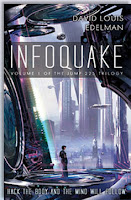Fast Forward 2: Best of the Year
 In the just-released December issue of Locus, Gardner Dozois breaks down 2008’s best sf anthologies in his column, “Gardnerspace”.
In the just-released December issue of Locus, Gardner Dozois breaks down 2008’s best sf anthologies in his column, “Gardnerspace”.
“This has been an almost unprecedented year for the number of first-rate original SF anthologies published, at least since the heyday of Orbit, New Dimensions, and Universe in the ’70’s. …I’d have to say that the three strongest original SF anthologies of the year were Lou Anders’ Fast Forward 2,
Jonathan Strahan’s Eclipse 2, and Strahan’s The Starry Rift…. Of these, I think I’d give a very slight edge to Fast Forward 2.“
Meanwhile, at Strange Horizons, Alvaro Zinos-Amaro writes:
“Fast Forward 2 proves itself that rare beast among anthologies of the imagination: one whose content actually provides a materialization of its own theoretical blueprint.”
Lots of nice things said about each of the individual stories. And (I must add) a very well-written review too, with paragraphs like:
“Catherine Drew” by Paul Cornell is wildly inventive. Its Hero, Hamilton, speaks in a way (“‘You’ve got a problem, Miss Drewe,’ he said”) that captures the essence of this alternate-history spy thriller in a British Empire-dominated future. The plot, propelled not so much by a single McGuffin as by a combustible gas of intelligent deceptions and counter-deceptions, makes as much sense as it needs to:
‘Is that the mission, sir?’
‘No. We’ve created and are ready to plant chaotic information of an unbreakable nature strongly suggesting that this has already happened…’ (p. 22)The alternate history milieu expertly justifies not only the background but the feel of the world that Cornell creates, yet is never so startling as to prove distracting from Hamilton’s exploits. Shaken, not stirred? More like vacuum-decompressed.
And then, in a final summation about the purpose of SF:
“What it should do, above all else, is tell stories well, so well that they cannot be disregarded, so well that they cannot but be taken seriously. Fortunately for us, Fast Forward 2 arrives with gifts that do just that. May it be followed by plenty of equally riveting and well-produced sequels.”
What a nice start to my Monday.
Fast Forward 2: Best of the Year Read More »










